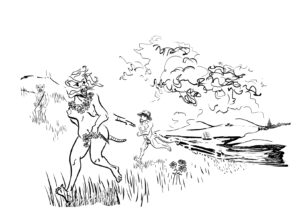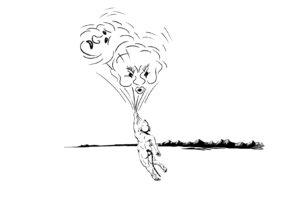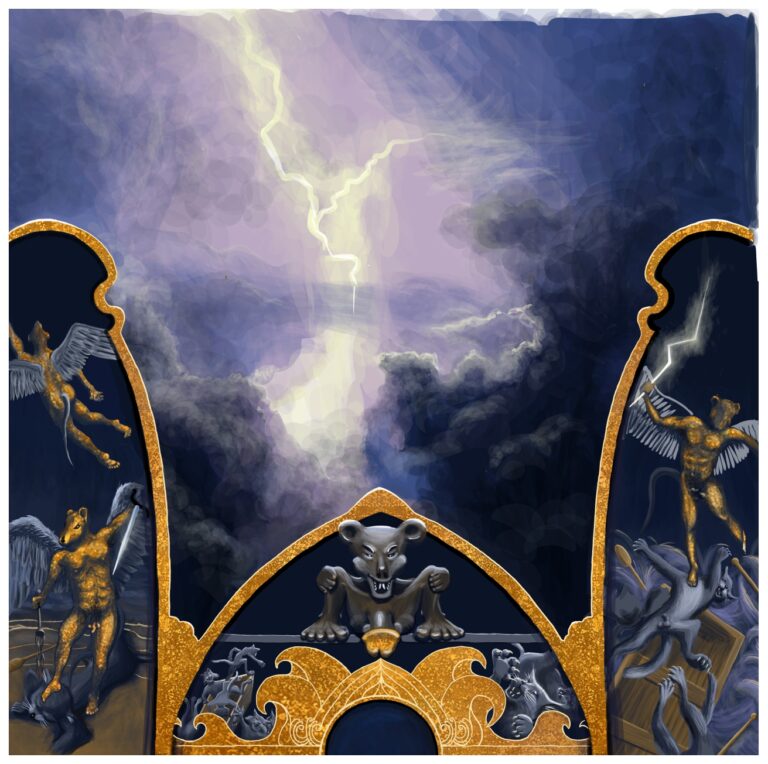
Thank you.
Your message has been sent and will receive a response.
Meanwhile, you can access
HunGar Book Galley
By clicking HERE.

Admonished by the East Wind, the Rat God
looketh to his home-land and seeth much to
alarm and also something fair.
Rose lamps lighting the eastern portal of the world signalled the Sun’s imminent arrival and a new day open for business far across the sea in Ungolia, land of rolling hills, verdant pastures and buxom shepherdesses. The Rat God stretched and yawned, scratched his balls, yanked on his weiner, and thought about breakfast. He sniffed the air. It smelt of grilled trout.
He had tarried. There was good feasting in the land of Ungolia. The climate was balmy, and the jolly breeze made him feel like a young god again, rumbunctious and horny. The countryside abounded with plump, ripe rat maids. He had enjoyed much sport slipping inside randy ratlings to chase lasses over the grassy hills or steal smooches behind hay-stacks. He had dallied, deflowered, seduced, raped, shot his divine seed and got with child to his heart’s content.

Guiltily, he thought of Ratona. He tried to reassure himself that Othon could cope without him, albeit at the same time immuring himself from any news from that quarter. He thought he would put off checking in until after the Rising of the Cat’s Teeth, when he hoped things back home would be reasonably quiet and there wouldn’t be a lot to deal with. It was always a little hard settling into one’s duties again after the irresponsibilities of vacation. Of course, one grows weary of anything if it goes on too long, even the carefree profligacy of a holiday. One becomes eager to get back to the old routine. But he was not quite ready yet.
On his way to breakfast, he bumped into the East Wind.
‘Huh!’ he said. ‘I‘ve not seen thee in an age!’
‘Dissemble not that thou’rt joyed to see me,’ admonished Eurus.
‘Must I dance a caper to gratify thee of a welcome? Come and breakfast with me, chum, and bibe a horn of the blonde wine they make in these parts, that will make thy prick ticklish as a jackrabbit’s.’
‘Thanks, but I am here on business, and ‘tis mickle late in the day for breakfast.’
‘Why, then let us slow our pace and call it lunch when we get there. Business can always wait. The day is too fine to waste on tiresome duty.’
‘Bless me, thou’rt a careless soul. All fucking and feasting is it?’
‘I’m on vacation,’ said the Rat God defensively.
‘Vacations have an end. Thou wast here last time I blew through.’
The Rat God scowled. ‘Am I wed to thee, that thou’rt my scold? Off with thee, killjoy! Blow!’
‘I have news to impart.’
‘Find another chump to tell it to.’
‘It concerneth Othon.’
‘Othon?’
‘Well mightest that name clean ‘scaped thy memory, so negligent hast been of its bearer.’
‘That bug can get on without me. Besides, why am I the one called negligent? Why, dost know how long the rain’s been entering through my roof over that way? And hast seen the way he neglects his wives? He taketh us all for granted!’
Then chided the East Wind, ‘An absent and careless God hast been indeed. Why would he fix the roof of that old temple when he hath raised thee a brand new one?’
‘A brand new one? That would be a wonder! To spend a little coin on something besides his wenches!’
‘ ‘Tis a wonder indeed and th’envy of all the Gods. And mickle wonder that thou knowest nothing of it. That’s how little notice hast given thy homeland. Thou art ignorant of their trials, of their need for thee and of their deadly peril.’
‘What peril?’ The Rat God was becoming alarmed. Why indeed had he been so irresponsible?
‘Tsk, tsk,” said the East Wind.
‘Don’t tsk me, thou old prim-mouthed widow-prude! What peril, I demand to know?’
‘Dost thou know not how long since it rained?’
‘Not so long, I ween. I sent thither some rain clouds just . . . only last . . . . ’ The Rat God knitted his brow to recall.
‘And I suppose that thou trusted such heedless, fickle things to get there on their own? Naturally, the little fools went astray.’
Knowing himself to be in the wrong, the Rat God waxed hot. ‘Nay, I didn’t send them on their own. I sent them with thy brother. ‘
‘Notus?’
‘Aye, the same. There’ll be hell to pay if he’s let me down.’
‘Now there’s a feeble excuse. kenest well what a wastrel he is! Yet they say kind findeth kind. I ween ye be as mickle matched to each other as two pick-pockets.’
The Rat God made fists of his hands. ‘Why, I shall not take insults from a bag of wind! Hast thou more to tell, or tarriest only to rag me? For, we shall come to blows anon.’
‘Friendly words indeed to one who hath done thee a service! I’ll trouble thee no more!’
‘Much thanks, and if I may give thee a loving word of advice in turn, it is in future to shove thy snout in thine own trough! Now piss off!’
In a fit of temper, the East Wind whirled about the Rat God, pelting dust into his face and eyes, then blustered off. He could not resist the last word, however, so flung over his back, ‘See to thy duty, Rat,’ before disappearing entirely.

Muttering imprecations, the Rat God snatched the tails of a brace of coltish breezes. They squealed indignantly, but he knocked them together and steered them up to a passing cloudlet that he hopped on to. His gaze travelled across the salt sea till it reached the surf-beaten strand of his homeland. He sniffed the air and immediately wrinkled his nose in disgust, startled by a repugnant odour revolting as arm-pit, stinking feet and fouled hinder parts. It reeked as if all Ratona were one decaying dead rat. This could not signal anything good. His gaze fell upon the rat city. He was dismayed to see how shrivelled the lake had become. He saw the preparations the rats were making for their defence. These defences seemed absurdly puny, like the stick a terrified child, abandoned by his parents in the forest, takes up in hope of fending off lions. Anxiously he numbered his people. First, he looked for King Othon. He peered through the windows of the palace until he found him. The Rat God was grieved to see how aged the King had grown. He was bent under a weight of sorrows. The Rat God suppressed a sob of pity. Next, he searched among the Lords. Where were Prince Hranu and the sweet youth Lord Esan? The Rat God’s anxiety increased. Among the common folk, why were so many widowed and orphaned? The weeping of his children caused the Rat God’s own eyes to moisten and a sob to well up from his breast. What a feckless, negligent God he had been. Deliberately he had looked away from Ratona and had turned a deaf ear. But now as he listened he could hear their prayers and lamentations. He saw the gifts they offered him. The smallest sacrifices moved him the most, drawing as they did on his pity. On the altars of the city the priests were sacrificing water. The element that was now most precious, most needful, most wanting for the salvation of the nation, the priests were pouring over red coals, where it hissed and turned to vapour. The vapours drifted in the air, piling storey upon storey into ever more solid masses that blossomed into domes and cupolas. The core of this towering edifice was luminous with gold and honey. There were facets of rose pink and indigo, apricot and eggplant. Its outline was so feathery that it melted into the sky. The Rat God was awestruck. How had the rats managed to erect such an heavenly mansion? If built of brick, how had they turned clay into such an airy substance? If not brick, then what luminous and unearthly material had they found? It was as if they had mined the heavens. Here, clearly, was not an abode intended for any ordinary God, no, but of a great God. A God among Gods. All the Rat God’s gluttonous, carnal lust washed away as offal. He felt cleansed and edified and meant for higher things. He was over-whelmed with desire to live up to the God his people imagined him to be.
Then his gaze was captured by movement in the forest beyond the city. He saw flowing like water among the trees hordes of cats. At the lake’s edge they were preparing boats to cross. He was outraged by their impudence. Cats daring to enter boats! Farther his gaze searched, reaching the foothills. He scaled the mountain heights and entered the stronghold of Katerina. He was transfixed by flashing eyes. It was not Katerina, however, but the Cat Goddess herself. Her fur was white as snow, white as death, seated on her throne of white bones. Dangling from her jaws was a limp body. As she approached him, he cried out in anguish, for it was the headless putrid corpse of the once fair and noble Prince Hranu empaled upon her fangs. With that cry he broke free of her spell, jumping back just in time to avoid the rake of her claws. He tumbled backwards off the mountains. He beheld his city in flames, the miraculous temple crumbling in ruin. ‘Why thou cunt,’ he said in great wrath. ‘From maul to twat shall I rip thee in twain.’
He leapt down from his cloud and summoned two angels. ‘Fly ye without delay to all the provinces of the sky and find every rain cloud, the blackest and heaviest ye can find. Corral and shepherd them hither. Find all the thunderclaps that ye may, every lightning spear withal. We shall here assemble the most tremendous deluge than any yet devised and drive it towards Ratona. We shall make such a racket as the cats will think that the firmament is cracking over their heads. We will wash them out of their boats and drown them like kittens. Any who reach shore will be burnt to cinders. In all her nine lives, Katerina will never forget and ever rue this day that she attempted to break down my city. Go, I say, and make ye every haste to execute my bidding.’
So, his servants flew to every region of the sky. They chased down every black cloud, how-so-ever small. They drave them in an herd back to Ungolia, till the sky above that land was darkened to mid-night. They gathered thunder-claps and lightning spears. On the lofty sea cliffs of Ungolia they marshalled such a storm that had not been seen since the first framing of the world. Then the Rat God entered his chariot. With his angels all in flashing armour on either side of him, they drave that deluge over the billows of the sea and on to Ratona, where for many days the lake had lain comatose, withered under the sun. As the waves that once had licked at the feet of the city walls retreated, there had emerged a belt of sloping mud, broadening each day, drying and cracking as it was baked hard, save at the main gate where the Great Canal still trickled out like mucous from a runny nose. As the first cats climbed into their unfamiliar craft, nervous of tipping, they noticed with ill-ease dark clouds piling up over the sea. The water was troubled by a sudden rising breeze.

‘Every water-way between here and the mountains feedeth this lake, which will rise quickly. We may become hemmed between the city ramparts and the lake, without ground to erect our siege towers. If we must thereby row back ashore we will have endangered our cats with nothing accomplished save a clown show for the amusement of our enemy.’
So argued one of Ginger’s captains, Reginald, who advised delaying the crossing till the storm’s passing. Ginger could barely tolerate listening to this baby talk. Unless the city were broken, he could not deposit the fat king rat, bound hand and foot, before the feet of Katerina, and, like the girl for her bridal day, it was that triumph towards which every thought, word and deed of Ginger was bended. Reginald’s advice made as much sense to him as if he had relayed it in Hindoo. ‘Delay breedeth danger,’ he said, and pointed towards the city, to the signal fire burning on top of the watch tower. ‘Some perfidious traitor gave warning to the rats, which hath lost us five hours. Othon’s cousin Dristan may be here soon as th’evening. We must have a ready greeting for that fiend, else our design be ruined.’
The mention of evening sounded strange to all, for it seemed that night already hovered over them, so dark grew the day. They shivered in the sharp wind, looked anxiously up where menacing, iron-coloured clouds a-massed, piling up in storey upon craggy storey, frightful as the first chaos, or the world’s end. Piercing the clouds at times, as if rushing from window to window of a ruined mansion, the sun glared down its eye of malice. Ginger glanced up and caught a fat drop of water in his eye. Wiping it away, he said, ‘Are ye all scaredy cats, afeard of a little damp weather?’
‘ ‘Tis no summer shower in store, my liege. I ween Dristan a lesser danger to our designs than venturing our craft in flood and deluge that never were they devized to ship,’ answered Reginald. ‘Freighted with cats, ‘twould not take much water to swamp ‘em.’
Disliking his captain’s persistence, the hot-headed Ginger dealt him a blow that broke his teeth. His other captains stood aghast, but none dared speak against the blow, albeit inwardly siding with Reginald, because Ginger was the Queen’s consort and they feared to be brought before her on charge of treason. Ginger stamped away. He made a tour of the beach, flinging threats and looks dark and malignant as the sky in all directions, impatient with every delay.
So, the scared cats, loathing the water, climbed into their boats and rowed from shore. The rain fell in sheets and the waves roiled and plunged. Many cats turned sick. There was such a din of thunder all about them that it sounded as if the whole world roared its fury at their assault. Then, more dreadful, the Rat God threw down his lightning spears. The trees at the edge of the swamp burst into torches whose flames turned the lake to frothing crimson. Rain fell now in a solid mass into the boats. Beast-like waves rampaged, heaving into view from all sides, rearing with frothing paws and throwing themselves into the boats. Cats threw down their oars to bail. Unknown to Katerina’s host, however, a still more deadly peril awaited as they approached the ramparts of the city. They did not know that they entered the shadow of the great temple, had it a shadow, which it had not, save faintly in brightest day. They saw no walls nor domes. Nor, until it was too late, could they perceive through the gloom and dense rain the monstrous aqueous serpents slithering from the vast but invisible roofs and diving into the lake in endless coils. Too late they saw the grinning gaping gargoyles that barfed these murtherous worms. The snaking monsters blasted straight through the boat bottoms. They ripped off the bulwarks, sliced boats in half and smashed them to bits. The lake boiled with boatless cats. Beholding in appalment the disaster befalling the vanguard, the crews of the next range of boats sought desperately to reverse, which maneouvre spread chaos and panic through the entire fleet.
One-quarter of Katerina’s army sank beneath the waves never to reappear. One-quarter floundered blindly they knew not in what direction, milling in circles, till overcome with exhaustion they too submitted to the waves. One-quarter made it out of the lake, but, stumbling in the fens and losing themselves in the labyrinth, these sodden felines were easy quarry for the rats of Prince Dristan, when Othon XVIII’s cousin arrived, skilled with nets and canoes. These cats were destined for the altars of the rats. Thus was Ginger captured. Ever after cats recalled that he slayed twelve warrior rats before he was at last subdued. Rodents, just as eager to emphasize the ferocity of their foe, made it twenty. Prince Dristan himself put out his eyes. He was trussed up like a turkey and borne through the city gate on a barge, the bells of the twelve towers pealing rapturously. The rain tapered, the vast black mass in the sky, lightened of its load, now rose and fragmented into many islands. The Rat God dismissed all. The cloud fleet sailed away. Then the Rat God went down and entered through the main gate of his new temple, well pleased with his work, ravenous for roasted cat flesh.
As to the fourth quarter of her army, these made it back to Katerina. The meagre number, the shattered faces, the grievous wounds spoke all. The city was plunged into grief.

Your message has been sent and will receive a response.
Meanwhile, you can access
By clicking HERE.